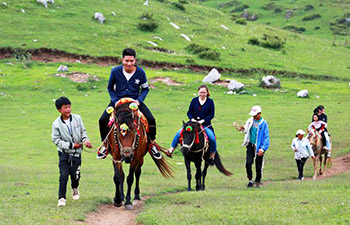by Xinhua Writers Lyu Qiuping, Wang Xuetao and Chen Haoquan
TAIYUAN, July 18 (Xinhua) -- Except for some chickens he raises, Feng Kaiping, 59, is the only creature of any note living in a remote temple in north China.
Perched on a cliff in Pingshun County, Shanxi Province, Jindeng Temple has no running water or connection to public transport. No one lives nearby, but Feng has worked there for 23 years.
Dating back some 600 years to Ming Dynasty (1368-1644), the temple is known for its 500-plus Buddhist statues and scores of stone pagodas.
Every day, he cleans the temple, wanders around and, occasionally receives visitors. He knows how to use a fire extinguisher and he must inform the police in case of any incidents.
Graduating from a local opera school, Feng failed to find the theatrical stardom he had dreamed of and, in 1985, found himself married and living off some odd jobs in his hometown. Then, in 1995, the local cultural bureau chief, a former teacher at the opera school, persuaded him to go to work in Jindeng.
In February, the temple finally got connected to the mobile network. No longer would Feng have to trek for hours to make a simple phone call. Surveillance cameras will be connected to the police network this year, ensuring round-the-clock monitoring of the site.
Feng has witnessed the formerly isolated Jindeng move closer to the outside world.
Until 2007, there was no electricity in the temple. Feng lit candles in the evening and relied on the radio for his entertainment.
Years ago, Feng was not the only custodian. Then, when four gangs of robbers raided the temple for the precious statues, his fellow guards decided they had had enough and scarpered. Cultural relics theft in remote mountainous areas was not uncommon in the 1990s.
"Once my fellow custodian and I were driven to the edge of the cliff by an armed gang who took away 14 Buddha statues," he recalled. "Both of us could have easily fallen to our deaths."
"Unlike the other guards who were just volunteer villagers, I was sent by the cultural heritage protection authorities. I could not simply run away whenever trouble threatened," he said. "I have nothing to lose but my life."
Tourists did not show up until 2007, when the local government built a narrow road up to the temple. The number of visitors is still less than 1,000 a year, many of whom are cyclists in summer and autumn.
Among the 30 plus temple halls, the most peculiar, Shuilu, was built on a pool formed naturally by water dripping from the roof. Feng gets his water from the pool.
"When winter comes, it is just me here," he said. He often spends many days without uttering a single word. Foggy days are the most difficult.
"At the sight of nothing, I feel extremely lonely."
On a bright day, Feng likes leaning on the fence and looking at the far mountains, smoking cigarettes one after another.
It takes him up to seven hours, including a two-and-a-half-hour trek, to return home to the outskirts of Changzhi City. He sometimes goes home once every one or two years, while his wife visits the temple every few months, bringing him food and giving him a haircut.
"If I am not here, the temple is left unattended," he said.
Feng never eats the eggs from the chickens he raises in the temple. His wife takes them down the mountain for his granddaughter. "Compared with those you can buy in town, eggs laid here are more nutritious and tasty," Feng said.
Feng has three children, all raised by his wife on her own. In 2005, his wife and daughter were injured in a bus crash, but Feng knew nothing about it until they had recovered.
"The telephone (to the nearest family from the temple) could not connect, so I just gave up calling," says his wife, Meng Ximei.
Shanxi Province has some 1,000 custodians like Feng. He earns 2,000 yuan (300 U.S. dollars) each month, and will get a pension when he retires next year.
The temple now is under repair and workers come every day. The government earmarked 57 million yuan for the repair project starting in 2015, which will end next year.
"With the relics restored and the camera surveillance installed, I can retire at ease next year," he said.

















